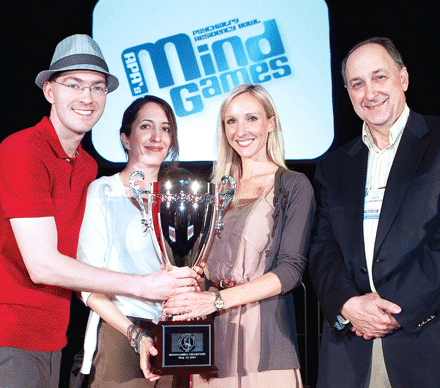Boston Takes Top Honors
What inherited disorder of myelin can be seen as a model for schizophrenia as it has both positive and negative symptoms and can begin in late adolescence?
In psychoanalytic theory, what defense mechanism turns negative impulses into positive or productive actions or emotions?
What psychotropic medication has been associated with polycystic ovarian syndrome?
Name the 140th president of the American Psychiatric Association. (Hint: He's the incoming one.)
Those were some of the questions residents from three institutions answered during the fifth annual MindGames competition at APA's 2011 annual meeting in Honolulu. The winners of this year's competition were residents from Boston University School of Medicine, pictured with MindGames moderator Glen Gabbard, M.D. From left to right they are Mark Oldham, M.D., Ana Ivkovic, M.D., and Brie Beaudoin, M.D.

Competing against Boston were residents from New York Presbyterian/Cornell Campus and the University of Pittsburgh Medical Center. The three teams advanced to the final competition in Honolulu after a qualifying phase that began in February with more than 100 programs from across the United States and Canada participating in an online timed exam.
Residents were tested on their knowledge of a wide range of topics related to psychiatry in particular and medicine in general in a "Jeopardy"-style format that attracted a packed crowd of supporters and cheerleaders for all three programs.
Question categories included "Famous Johns" (that is, famous psychiatrists named John), as well as "Psychopharmacology," "Psychotherapy," "Neurology," "Basic Statistics," "Comorbid," "It's on the Test," "Primary Medicine," "Cultural Psychiatry," and "Potpourri."
The judges were Naleen Andrade, M.D., Charles Nemeroff, M.D., and Michelle Riba, M.D. The competition is supported by a grant from AstraZeneca and cosponsored by the American College of Psychiatrists.
More information is posted at <www.psych.org/mindgame>.



